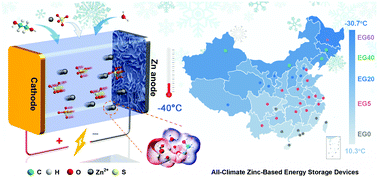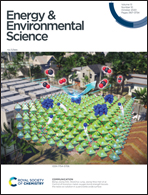An aqueous hybrid electrolyte for low-temperature zinc-based energy storage devices†
Abstract
Aqueous zinc-based energy storage (ZES) devices are promising candidates for portable and grid-scale applications owing to their intrinsically high safety, low cost, and high theoretical energy density. However, the conventional aqueous electrolytes are not capable of working at low temperature. Here we report a frigostable, cost-effective, safe and eco-friendly hybrid electrolyte with high zinc-ion conductivity (6.9 mS cm−1 at −40 °C), and high reversibility of Zn plating/stripping, which consists of water, ethylene glycol (EG) and zinc sulfate salt (ZnSO4). Experiments together with theoretical calculations demonstrated that the unique solvation interaction of Zn2+ with EG can effectively enhance the hydrogen bonding between EG and H2O and weaken the solvation interaction of Zn2+ with H2O, thus providing the hybrid electrolyte with a lower freezing point and reversible Zn/Zn2+ chemistry. As a proof-of-concept, both Zn-ion hybrid supercapacitors (ZHSCs) and Zn-ion batteries (ZIBs) with the hybrid electrolytes delivered high energy densities (36 W h kg−1 for the ZHSC and 121 W h kg−1 for the ZIB), high power densities (3.1 kW kg−1 for the ZHSC and 1.7 kW kg−1 for the ZIB) and long-cycle life (5500 cycles over 110 days for the ZHSC and 250 cycles for the ZIB) at −20 °C. This work provides a new option for low-temperature energy storage devices.



 Please wait while we load your content...
Please wait while we load your content...